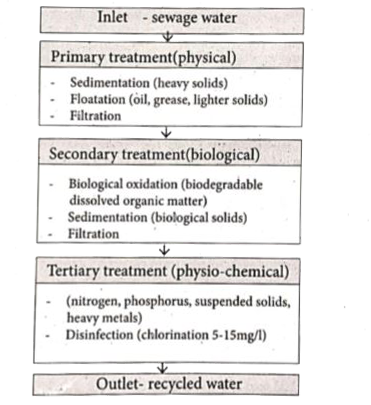What is water recycling? Explain the conventional wastewater recycling treatment?Solution in Tamil
Water recycling is reusing treated wastewater for beneficial purposes such as agricultural and landscape irrigation, industrial processes, flushing in toilets and ground water recharge. Conventional waste water treatment consists of a combination of physical, chemical and biological processes which remove solids, organic matter and nutrients from waste water.
The waste water treatment involves the following stages:
Primary treatment
Primary treatment involves temporary holding of the waste water in a tank. The heavy solids get settled at the bottom while oil, grease and lighter solids float over the surface. The settled and floating materials are removed. The remaining liquid may be sent for secondary treatment.
Secondary treatment
Secondary treatment is used to remove the biodegradable dissolved organic matter. This is performed in the presence of oxygen by acrobic microorganisms (Biological oxidation). The microorganisms must be separated from treated waste water by sedimentation. After separating the sediments of biological solids, the remaining liquid is discharged for tertiary treatment
Tertiary treatment
Tertiary or advanced treatment is the final step of sewage treatment. It involves removal of inorganic constituents such as nitrogen, phosphorus and microorganisms. The fine colloidal particles in the sewage water are precipitated by adding chemical coagulants like alum or ferric sulphate.

Topper's Solved these Questions
- ENVIRONMENTAL SCIENCE BOOK - FULL MARKSCHAPTER - ENVIRONMENTAL SCIENCE EXERCISE - EXERCISE (VI. Give reason)
3 Videos
- ENVIRONMENTAL SCIENCE BOOK - FULL MARKSCHAPTER - ENVIRONMENTAL SCIENCE EXERCISE - ADDITIONAL QUESTIONS (I. Choose the correct answer)
10 Videos
- ENVIRONMENTAL SCIENCE BOOK - FULL MARKSCHAPTER - ENVIRONMENTAL SCIENCE EXERCISE - EXERCISE (IV. Answer in brief)
8 Videos
- ECONOMIC BLOLOGYBOOK - FULL MARKSCHAPTER - ECONOMIC BLOLOGYEXERCISE - ADDITIONAL QUESTIONS (ANSWER IN DETAIL )
4 Videos
- NUTRITION AND HEALTH BOOK - FULL MARKSCHAPTER - NUTRITION AND HEALTH EXERCISE - ADDITIONAL QUESTIONS (V. Answer the following in detail.)
3 Videos
Similar Questions
Roots grow very deep and reach the layers where water is available. Which type of plants develops the above adaptation? Why?
View Solution............. includes plants, animals and all other living organisms.
View SolutionWhat are the two factors of biosphere?
View Solution1. Explain hydroponics and give its importance.
View SolutionWhat is food spoilage? What are the factors responsible for food spoilage ?
View SolutionSewage water is purified for recycling by the action of
View SolutionWhich processes are involved in the recycling of cell membrane ? What is the use of recycling ?
View Solutionपुनर्चक्रण किस प्रकार के अपशिष्ट हेतु उत्तम उपचार है -
View Solutionपुनर्चक्रण से क्या तातपर्य है ?
View Solutionपुनर्चक्रण से क्या तात्पर्य है?
View SolutionWhat are the uses of recycled water?
View SolutionWhat is the recycling process?
View SolutionWhat is the recycle process?
View SolutionExplain the importance of recycling the paper.
View SolutionWhat is recycle and how is it beneficial?
View Solution
